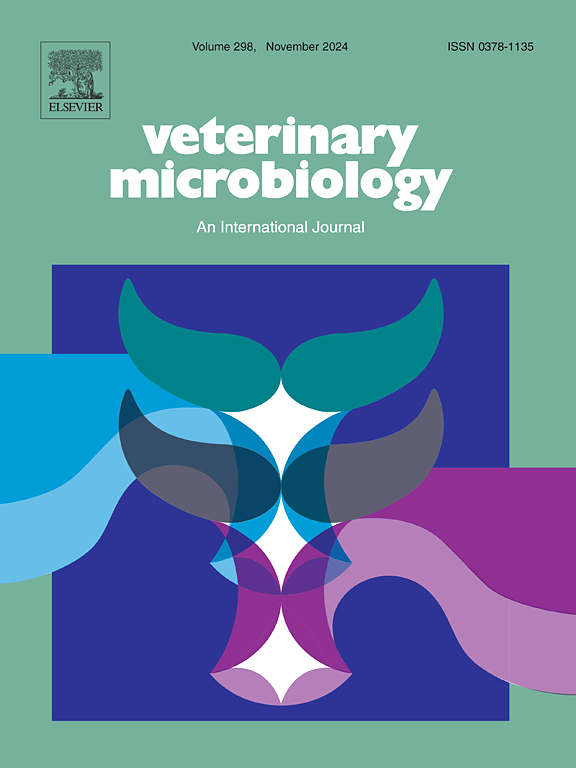UGPase:一种调节布鲁氏菌脂多糖合成、毒力和免疫原性的新分子
IF 2.4
2区 农林科学
Q3 MICROBIOLOGY
引用次数: 0
摘要
utp -葡萄糖-1-磷酸化转移酶(UGPase)催化udp -葡萄糖的合成,udp -葡萄糖是糖原生产的关键前体,也是细菌脂多糖(LPS)合成的重要成分。在这项研究中,我们证明了UGPase缺失显著破坏了布鲁氏菌的LPS合成,导致表型从光滑型转变为粗糙型,细菌毒力显著降低。体外和体内实验表明,UGPase的缺失削弱了布鲁氏菌感染宿主细胞的能力,降低了其在小鼠中的致病性。该缺失还显著改变了16M-ΔUGPase菌株的LPS结构,降低了其对布鲁氏菌阳性血清的特异性结合。此外,感染UGPase缺失突变体的巨噬细胞表现出炎症反应降低。在小鼠中,与野生型菌株感染相比,突变菌株感染导致细胞因子谱发生改变,其特征是促炎标志物(TNF- γ、IFN-γ和IL-2)上调,抗炎标志物(IL-10和IL-4)下调。本研究首次确定UGPase是布鲁氏菌毒力和免疫原性的关键决定因素。这些发现为布鲁氏菌发病机制的分子机制提供了新的见解,并突出了UGPase作为布鲁氏菌疫苗开发的一个有希望的靶点。本文章由计算机程序翻译,如有差异,请以英文原文为准。
UGPase: A novel molecule that regulates LPS synthesis, virulence, and immunogenicity of Brucella melitensis
UTP-glucose-1-phosphoryl transferase (UGPase) catalyzes the synthesis of UDP-glucose, a key precursor for glycogen production and an essential component in bacterial lipopolysaccharide (LPS) synthesis. In this study, we demonstrate that UGPase deletion significantly disrupted LPS synthesis in Brucella, leading to a phenotypic shift from a smooth to a rough type and a marked reduction in bacterial virulence. In vitro and in vivo experiments revealed that UGPase deletion impaired Brucella’s ability to infect host cells and diminished its pathogenicity in mice. The deletion also significantly altered the LPS structure of the 16M-ΔUGPase strain, reducing its specific binding to Brucella-positive serum. Additionally, macrophages infected with the UGPase deletion mutant exhibited a decreased inflammatory response. In mice, infection with the mutant strain led to altered cytokine profiles, characterized by upregulation of pro-inflammatory markers (TNF-ɑ, IFN-γ, and IL-2) and downregulation of anti-inflammatory markers (IL-10 and IL-4) compared to infections with the wild-type strain. This study identifies UGPase as a critical determinant of Brucella virulence and immunogenicity for the first time. The findings provide novel insights into the molecular mechanisms underlying Brucella pathogenesis and highlight UGPase as a promising target for the development of Brucella vaccines.
求助全文
通过发布文献求助,成功后即可免费获取论文全文。
去求助
来源期刊

Veterinary microbiology
农林科学-兽医学
CiteScore
5.90
自引率
6.10%
发文量
221
审稿时长
52 days
期刊介绍:
Veterinary Microbiology is concerned with microbial (bacterial, fungal, viral) diseases of domesticated vertebrate animals (livestock, companion animals, fur-bearing animals, game, poultry, fish) that supply food, other useful products or companionship. In addition, Microbial diseases of wild animals living in captivity, or as members of the feral fauna will also be considered if the infections are of interest because of their interrelation with humans (zoonoses) and/or domestic animals. Studies of antimicrobial resistance are also included, provided that the results represent a substantial advance in knowledge. Authors are strongly encouraged to read - prior to submission - the Editorials (''Scope or cope'' and ''Scope or cope II'') published previously in the journal. The Editors reserve the right to suggest submission to another journal for those papers which they feel would be more appropriate for consideration by that journal.
Original research papers of high quality and novelty on aspects of control, host response, molecular biology, pathogenesis, prevention, and treatment of microbial diseases of animals are published. Papers dealing primarily with immunology, epidemiology, molecular biology and antiviral or microbial agents will only be considered if they demonstrate a clear impact on a disease. Papers focusing solely on diagnostic techniques (such as another PCR protocol or ELISA) will not be published - focus should be on a microorganism and not on a particular technique. Papers only reporting microbial sequences, transcriptomics data, or proteomics data will not be considered unless the results represent a substantial advance in knowledge.
Drug trial papers will be considered if they have general application or significance. Papers on the identification of microorganisms will also be considered, but detailed taxonomic studies do not fall within the scope of the journal. Case reports will not be published, unless they have general application or contain novel aspects. Papers of geographically limited interest, which repeat what had been established elsewhere will not be considered. The readership of the journal is global.
 求助内容:
求助内容: 应助结果提醒方式:
应助结果提醒方式:


